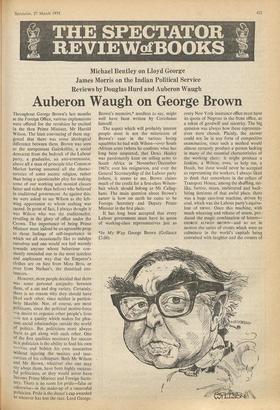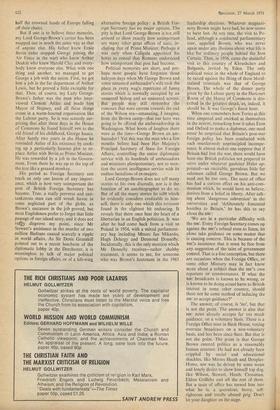THE SPECTATOR REVIEWABOOKS
Michael Bentley on Lloyd George James Morris on the Indian Political Service Reviews by Douglas Hurd and Auberon Waugh
Auberon Waugh on George Brown
Throughout George Brown's last months at the Foreign Office, various explanations were offered for the revulsion he excited in the then Prime Minister, Mr Harold Wilson. The least convincing of these sug- gested that there was some ideological difference between them. Brown was seen as the unrepentant Gaitskellite, a social democrat from the bedrock of the Labour party, a gradualist, an anti-communist, above all a man of principle (the Common Market having assumed all the charac- teristics of some ascetic religion, rather than being a questionable ploy for making some of our working and monied classes fatter and richer than before) who believed in traditional government. As against this, we were asked to see Wilson as the left- wing opportunist to whom nothing was sacred. In point of fact, I always thought it was Wilson who was the traditionalist, revelling in the glory of office under the Crown. The importance of being Prime Minister must indeed be an agreeable prop to those feelings of self-importance in which we all occasionally like to indulge ourselves and one would not feel warmly towards anyone whose behaviour con- stantly reminded one in the most tasteless and unpleasant way that the Emperor's clothes are on hire from Moss Bros, or even from Nathan's. the theatrical cos- turn iers.
However, most people decided that there was some personal antipathy between them, of a cat and dog variety. Certainly, there is no reason why they should have liked each other, since neither is particu- larly likeable. Nor, of course, are most politicans, since the political motive-force —a desire to organise other people's lives —is not a quality which makes for plea- sant, social relationships outside the world of politics. But politicians must always learn to -get along with each other. One of the first qualities necessary for success in a politician is the ability to feed his own Vfl ties and bolster his own insecurites Without injuring the vanities and inse- curities of his colleagues. Both Mr Wilson and Mr Brown, whatever else one may say abut them, have been highly success- ful politicians, or they would never have become Prime Minister and Foreign Secre- tary. There is no room for pride—false or otherwise—in the make-up of a successful politician. Pride is the dunce's cap awarded to whoever has lost the race. Lord George- Brown's memoirs,* needless to say, might well have been written by Coriolanus himself.
The aspect which will probably interest people most is not the reiteration of Brown's case in the various losing squabbles he had with Wilson—over South African arms (where he confirms what has long been suspected, that Denis Healey was passionately keen on selling arms to South Africa in November/December 1967); over his resignation, and over the General Secretaryship of the Labour party (where, it seems to me, Brown claims much of the credit for a first-class Wilson- bait which should belong to Mr Callag- han). The main question about Brown's career is how on earth he came to be Foreign Secretary and Deputy Prime Minister in the first place.
It has long been accepted that every Labour government must have its quota of working-class representatives just as *In My Way George Brown (Gollancz £3.00) every New York insurance office must have its quota of Negroes in the front office, as a token of goodwill and sincerity. The big question was always how these representa- tives were chosen. Plainly, the answer could not lie in any form of competitive examination, since such a method would almost certainly produce a person lacking in many of the essential characteristics of the working class : it might produce a Jenkins. a Wilson, even, so help me, a Heath, but these would never be accepted as representing the workers. I always liked to think that somewhere in the cellars of Transport House, among the shuffling, rat- like, furtive, mean, embittered and back- biting denizens of that awful place, there was a huge cast-iron machine, driven by coal, which was the Labour party's equiva- lent of ERNIE. Once this machine, with 'much wheezing and release of steam, pro- duced the magic combination of letters— GEORGE ALFRED BROWN—and so set in motion the series of events which were to culminate in the world's capitals being convulsed with laughter and the owners of half the crowned heads of Europe falling off their chairs.
But if one is to believe these memoirs, my Lord George-Brown's career has been mapped out in much the same way as that of anyone else. His father knew Ernie Bevin (who stopped George joining the Air Force in the war) who knew Arthur Deakin who knew Harold Clay and every- body knew everyone else. What with one thing and another, we managed to get George a job with the union. First, we got him a job in the fur department of Arthur Lewis, but he proved a little excitable for that. Then, of course, my Lady George- Brown's father was the man who inter- viewed Clement Attlee and made him Mayor of Stepney, and all these things count in a warm-hearted organisation like the Labour party. So it was scarcely sur- prising that after three days in the House of Commons he found himself PPS to the old friend of his childhood, George Isaacs. After barely two years in the House he reminded Attlee of his existence by cook- ing up a particularly fatuous plot to re- place Attlee with Bevin as Prime Minister. He was rewarded by a job in the Govern- ment. From there he was up to the top of the tree like a greased monkey.
His period as Foreign Secretary can teach us only one lesson of any import- ance, which is how very unimportant the post of British Foreign Secretary has become. True, a really perverse and can- tankerous man can still wreak havoc in some neglected part of the globe, as Brown's successor in the job proved, but most Englishmen prefer to forget that little passage of our island story, and it does not really disprove my point, since Mr Stewart's assistance in the murder of two million Biafrans caused scarcely a ripple in world affairs. As Sir Denis Greenhill pointed out to a recent luncheon of the diplomatic lobby in the Dorchester, it is meaningless to talk of major political options in foreign affairs, or of a left-wing alternative foreign policy: a British For- eign Secretary has no major options. The pity is that Lord George-Brown is not still around to show exactly how unimportant are many other great offices of state, in- cluding that of Prime Minister. Perhaps it was only when Caligula appointed his horse as consul that Romans understood how unimportant that post had become.
Political memories are short, and per- haps most people have forgotten those halcyon days when Mr George Brown and some unnamed ambassador's wife took the place in every wag's repertoire of funny stories which is normally occupied by an unnamed bishop and an unnamed actress. But people may still remember the rumours that were current towards the end of the Wilson era—emanating, I imagine, from the Brown camp—that our hero was going to be offered the ambassadorship in Washington. What hoots of laughter there were at the time—George Brown an am- bassador! Yet this was the man who a few months before had been Her Majesty's Principal Secretary of State for Foreign Affairs, controlling the entire diplomatic service with its hundreds of ambassadors and ministers plenipotentiary, not to men- tion the secret intelligence service with its endless battalions of ex-majors.
Lord George-Brown does not tell many stories to his own discredit, nor is it the function of an autobiographer to do so. But of all the many stories he tells which he evidently considers creditable to him- self, therels only one which this reviewer found in the slightest bit endearing. It reveals that there once beat the heart of a libertarian in an English politician. It was after he had come back from a visit to Poland in 1954, with a mixed parliament- ary bag including Messrs Ian Mikardo, Hugh Delargy and Desmond Donnelly. Incidentally, this is the only mention which Mr Donnelly receives—rather shabby treatment, it seems to me, for someone who was Brown's lieutenant in the 1963 leadership elections. Whatever magnani- mity Brown might have had, he now seems to have lost. At any rate, the visit to Po- land, although a conducted parliamentary tour, appalled Brown, who was never again under any illusions about what life is like for ordinary people behind the Iron Curtain. Then, in 1956, came the shameful visit to this country of Khrushchev and Bulganin, invited by Eden. The only political voice in the whole of England to be raised against the feting of these blood- stained criminals was that of George Brown. The whole of the dinner party given by the Labour party in the Harcourt Room of the House of Commons is des- cribed in the greatest detail, as, indeed; it should be. It was George's finest hour.
When one remembers how Tories at this time simpered and smirked at themselves in the mirror, remarking how it takes Eton and Oxford to make a diplomat, one need never be surprised that Britain's post-war foreign policy has been conducted with such murderously unprincipled incompe- tence. It almost makes one suppose that if Britain bad lost the war, there would have been one British politician not prepared to serve under whatever gauleiter Hitler ap- pointed—an excitable, garrulous little fur salesman called George Brown. But we need not be too sure. The taste of office has had a curious effect on his anti-com- munism which, he would have us believe, derives from a belief in liberty. After talk- ing about 'dangerous subversion' in the universities and 'deliberately fomented hostility to Britain,' he has this to say about the BBC: 'We are in a particular difficulty with the BBC. Every Foreign Secretary conies up against the Imes refusal even to listen, let alone take guidance on some matter that is causing concern. This is because of the BBC'S insistence that it must be free from any suggestion of the taint of government control. That is a fine conception, but there are occasions when the Foreign Office, or some other Ministry may in fact know more about a subject than the BBC'S own reporters or commentators. If what the I3BC broadcasts is known to be wrong, or is known to be doing actual harm to British interest in some other country, should there not be some method of inducing the BBC to accept guidance?'
The answer, of course, is 'no', but that is not the point. The answer is also that BBC news already accepts far too much guidance, on a voluntary basis. There is a Foreign Office man in Bush House, vetting overseas broadcasts on a non-voluntary basis, and has been since Suez. But that is not the point. The point is that George Brown entered politics as a reasonably .human creature. He had not already been crippled by social and educational shackles, like Messrs Heath and Douglas- Home, nor was he driven by some mean and lonely desire to show himself top dog. like Wilson, Stcwart, Heath, Crossman, Eldon Griffiths and all the rest of them. But a taste of office has turned him into what he is, a querulous, bossy, self- righteous and totally absurd prig. Don't let your daughter on the stage.











































 Previous page
Previous page